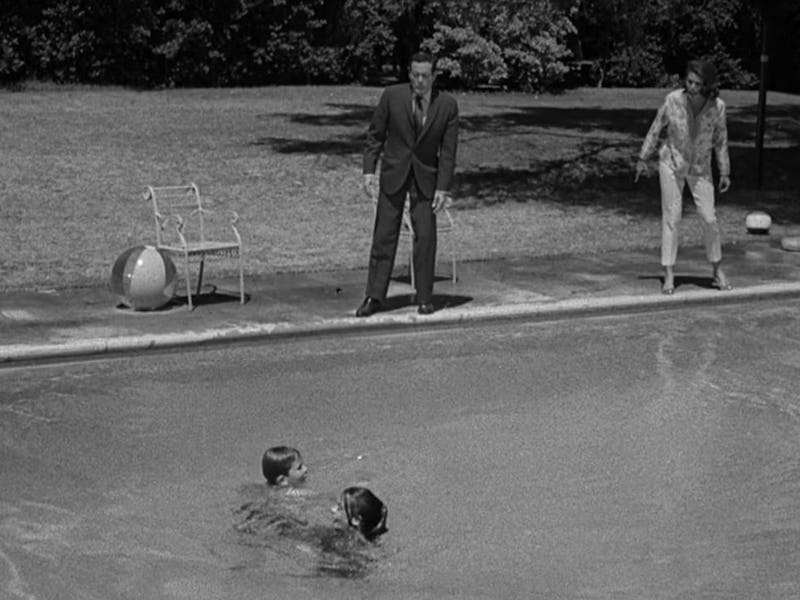Decades Ago, an Infamously Dark Sci-Fi Anthology Concluded With a Happy Ending
Take a dip.

After five seasons and 155 episodes of macabre twists and turns, the original run of the CBS anthology The Twilight Zone concluded with an uncharacteristically happy ending.
First screened 60 years ago, “The Bewitchin’ Pool” centers on Sport (Mary Badham) and Jeb (Jeffrey Byron) Sharewood, two affluent young siblings seemingly unperturbed when a straw-hatted boy suddenly emerges from their swimming pool, the latter poetically described by creator and narrator Rod Serling as “a structure built of tile and cement and money, a backyard toy for the affluent, wet entertainment for the well-to-do.” The pair subsequently accept his invitation to follow him back to his homeland, and after diving in after him, find themselves in a fantasy world that evokes The Adventures of Huckleberry Finn.
Although it’s a far cry from the life of luxury they’re used to, Sport and Jeb are immediately taken with the rustic setting, even more so when they meet Aunt T (Georgia Simmons), a kindly old lady who watches over countless kids seeking solace from real-world troubles. The Twilight Zone’s default tone primes us to believe she’ll have sinister intentions — perhaps a cannibalistic Hansel and Gretel-esque scenario due to her love of baking cakes, for example, or a wicked taskmaster, given how she instantly dishes out chores. But no, she really is just a grandmotherly figure who provides shelter for the unloved and unappreciated, and who wants to instill an understanding of the “dignity of work and the joy of labor.”
The entirely non-sinister Aunt T.
It’s understandable why Jeb and Sport are so reluctant to return to normality. Parents Gloria (Dee Hartford) and Gil (Tod Andrews) appear to spend every waking moment sniping at each other or their offspring. “Darn you loudmouth kids,” the former barks, despite her incredibly well-behaved children barely making a noise.
And then there’s the scene that serves as a guide on how not to announce a separation. Written by The Waltons and Falcon Crest creator Earl Hamner Jr. in response to the rising divorce rates in San Fernando Valley, “The Bewitchin’ Pool” was one of the first shows to address the issue, but the Sharewoods do so with the subtlety of a sledgehammer.
After asking Sport to summon Jeb for a development that will make “all their lives better,” Gloria coldly informs the pair she and their father are splitting up and moving “just as far apart as we can get” from the other. With her children understandably upset at such a devastating revelation, she adds salt to the wound, noting, “If it hadn’t been for you, we wouldn’t have stayed together for as long as we did.” Little wonder that when asked which awful parent they want to live with, Jeb and Sport decide neither.
Instead, without any hesitation, the two dive into the bewitchin’ pool to return to a life of hula hooping and domestic duties and, much to their mom and dad’s horror, completely disappear. As ghastly as the warring couple is, it’s hard not to feel some sympathy as they experience every parent’s worst nightmare, particularly when Gloria’s distant, distressed call is ignored by their now-forever estranged kids.
The primitive fantasy land beyond the pool.
But judging from Serling’s booming narration (“Who can say how real the fantasy world of lonely children can become? For Jeb and Sport Sharewood, the need for love turned fantasy into reality; they found a secret place”), the show presents the youngsters’ fate as uplifting rather than a bleak retreat into permanent childhood.
Even if you accept this interpretation, “The Bewitchin’ Pool” still makes for an unsettling and, at times, downright trippy watch. While The Twilight Zone’s final story is relatively straightforward, its presentation is anything but. Plagued by behind-the-scenes problems, producers were twice forced to redub all outdoor dialog. Unwilling to stump up the cash to fly Badham back to Los Angeles from her Alabama hometown, however, they instead replaced her with 40-something Bullwinkle voice actress June Foray, so Sport sounds like a 12-year-old in one scene and Rocky the Flying Squirrel in the next.
Then there’s the fact producers had to pad out the story to fill the 25-minute run time, which explains why the jaw-dropping divorce scene is “teased” (read: essentially played in full) at the start of the episode, and why several identical shots inspire an unnerving sense of deja vu. “The Bewitchin’ Pool,” therefore, isn’t exactly the majestic send-off a show that revolutionized fantasy, science fiction, and television in general deserved. It’s certainly one of the least popular episodes among fans. Yet for a series that built its reputation on subverting expectations, a relatively feel-good but still inherently bizarre finale feels strangely fitting.